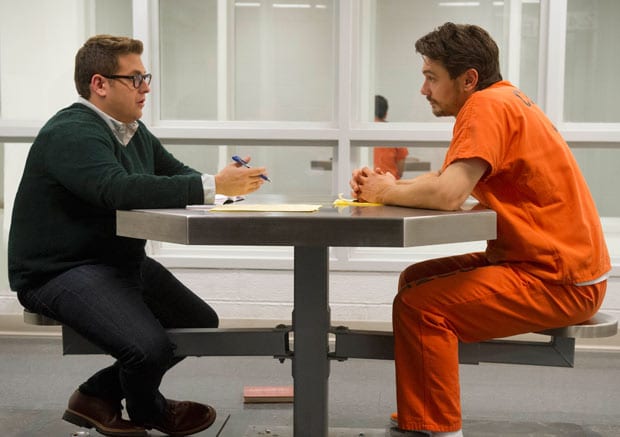A journo seeking redemption finds intrigue in ‘True Story’

IDENTITY THIEF | A disgraced journalist (Jonah Hill) pursues a story that could rehabilitate him by interviewing a killer (James Franco) who posed as him in ‘True Story.’
ARNOLD WAYNE JONES | Executive Editor
Admit it: If I told you Jonah Hill and James Franco were starring in a movie about a prisoner who steals the identity of a journalist, you’d assume it was written by Seth Rogen, directed by Judd Apatow and contained an insane number of weed and dick jokes. That may be the highest hurdle faced by True Story, which is most definitely not a comedy (and Rogen/Apatow are no where near it).
In fact, it could benefit from a touch of levity — it’s a dour and slightly sanctimonious outing that feels convoluted in its moralizing even as it keeps you guessing.
If you’ve seen the trailers, you might expect this to be a cat-and-mouse thriller a la Silence of the Lambs where an intrepid reporter is terrorized by a wide-eyed sociopath. In fact, it more closely resembles the love child of Capote and Shattered Glass. Mike Finkel (Hill) is a world-hopping social justice journo for the New York Times, who publishes a piece that, it turns out, falsified some details … sort of. The screenplay suggests that he was pressured by editors to conflate several characters and, by aiming at a “higher truth,” he merely got reckless. Disgraced and unemployable, he retreats to the woods of Oregon. That’s the Shattered Glass portion. (As the title suggest, it’s based on a true story.)
While licking his wounds, he discovers a man named Christian Longo (Franco) — just arrested for murdering his entire family — has been on the run using the alias Mike Finkel. Why did Longo choose Mike to impersonate? And is there a story here? From there, Mike gets drawn into Longo’s story, hoping to eventually write his own version of Capote’s In Cold Blood: The anatomy of a murderer. That is, if Longo really did it.
The film, the feature debut of director/co-writer Rupert Goold, is best when creating the cold dread associated with being an outcast. Early on, the scene where Finkel nervously defends his story to his Times bosses, you can feel the walls closing in on him, the sense of panic and slo-mo crumbling of his career. (As a journalist, I of course imagined what that must be like, with echoes of Janet Cook, Jayson Blair and Stephen Glass shooting through my mind as it must have Finkel’s.)
After that, though, his character reveals himself to be a sorry standard-bearer as the film’s protagonist. Finkel comes off as a less than honorable man in most particulars; I admired him (temporarily) for refusing to betray Longo’s confidences … until he weaselly and belatedly tries to break his word. It’s one thing to live by a code, no matter how blindly; it’s another to throw it out the window for no good reason. (Franco, who plays it close to the vest most of the time, runs acting circles around the Pillsbury-faced Hill.)
Still, despite an inconsistent visual style that toggles between Coen Brothers and CSI: Portland, Goold tries to dig into the psychology of transference, and he keeps the audience guessing as much as Finkel about whether to believe Longo. But in its rush to provide a metaphor for redemption, True Story saddles us with a sniveling hero who, in the end, we aren’t certain is worthy of our forgiveness.
This article appeared in the Dallas Voice print edition April 17, 2015.


